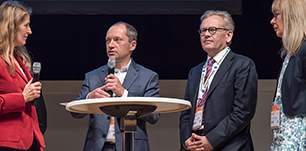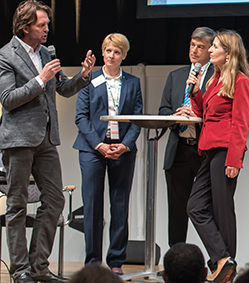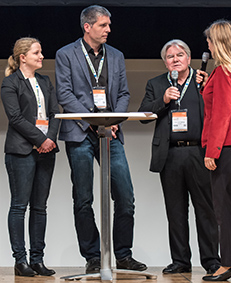Every year, up to half a million people in Germany are newly diagnosed with diabetes. But how can the disease be prevented, treated or even cured? In the German Center for Diabetes Research (DZD), specialists from different disciplines work together to develop individually tailored approaches for the prevention, diagnosis and therapy of diabetes and thus to counteract this widespread disease. At the 2017 Diabetes Congress, the DZD presented its integrative research approach. Under the motto "Diabetic Epidemic: Trend Reversal through Translational Research", DZD experts provided information about innovative therapy approaches, the influence of epigenetics on the pathogenesis of diabetes, new possibilities for prevention, as well as the latest results from research and clinical studies.
Lifestyle can be inherited
"The pathogenesis of diabetes is a complex process leading to the onset of the disease through a multi-faceted interplay of genes, lifestyle and environmental factors over the course of years. Only when we understand this process can we develop new approaches to treat or even prevent metabolic disease," said Professor Martin Hrabě de Angelis (photo below, 2nd from left), co-founder and board member of the DZD, at the Congress of the German Diabetes Association in Hamburg. Current research findings provide important insights into the pathogenesis of the metabolic disease. For example, DZD scientists have discovered that lifestyle factors can be transmitted to the offspring via epigenetic modifications. Genomic alterations as a result of lifestyle are one of the keys to how an organism responds to certain foods and why the disease course of diabetes varies from individual to individual," said Professor Annette Schürmann (photo below, right), speaker of the DZD and congress president.
 Organ crosstalk
Organ crosstalk
Whereas in the past researchers focused on the pancreas, nowadays the scientists look at the entire organism. Many different organs – such as the liver, brain, muscles and fat cells – play a decisive role in the development of diabetes. "In particular, accumulation of fat in the liver favors a disturbance of the blood glucose metabolism,” said Professor Michael Roden (photo above, 3rd from left), board member of the DZD. People with a fatty liver have a high risk of developing type 2 diabetes.
New approaches to therapy
But how can the metabolic disease be treated in the future? Multi-hormones offer new therapy possibilities for type 2 diabetes. DZD researchers led by Professor Matthias Tschöp (photo below, left) have developed a new active substance that combines the effects of the three gastrointestinal hormones GLP-1, GIP and glucagon. This agent lowers the blood glucose level and significantly reduces body fat. The active substance has already been tested successfully in the animal model and is now being tested in clinical trials.

Replacement of beta cells
For people with type 1 diabetes, the transplantation of beta cells could become more important in the future. Islet cell transplantation in protected capsules has already been successfully tested in patients. Here, unfortunately, the donor situation is the limiting factor, said Professor Stefan Bornstein (photo above, 2nd from right), Dresden. An alternative could be xenotransplantation, the transplantation of cells from another species, in this case the pig.
Can type 1 diabetes be prevented?
An important breakthrough has been achieved in the prevention of type 1 diabetes. A protective immune reaction can be triggered by oral insulin administration in children between two and seven years with an increased risk of diabetes. The immunologist Dr. Carolin Daniel (photo below, left) is investigating the mechanisms of such protective immune responses in order to be able to selectively target and halt the disease process in type 1 diabetes.
These are only a few examples illustrating the successful research work of the DZD in recent years. A major reason for this success is the interdisciplinary and cross-site cooperation. Founded in 2009, the national center is divided into five partner sites in Germany. Due to this structure, from the very beginning participants could be quickly enrolled in large-scale multicenter studies, according to Professor Hans-Ulrich Häring (photo below, 2nd from right), a DZD board member.

Identification of high-risk patients
For example, using pre-existing data, 8,000 people with prediabetes have been grouped into a large cohort with the aim of developing new, individual prevention and treatment strategies for people with diabetes. On the basis of this data, researchers are seeking answers to questions such as: How many of the people who have prediabetes actually develop diabetes? To what extent does gestational diabetes increase the risk of type 2 diabetes later on? The results of the lifestyle intervention study show that 20 to 30 percent of prediabetics do not benefit from a change in lifestyle. "The people in this group are of particular interest to us because they are also likely to have a high risk of organ damage," Professor Häring said. In the meantime approaches have been developed for individual therapies. "The DIfE – Diabetes Risk Test® provides important information on the individual diabetes risk," said Professor Matthias Schulze (photo above, 2nd from left (http://drs.dife.de)
Promotion of young researchers
The training of basic researchers and young physicians in translational research is important in order to solve the upcoming questions and to develop innovative approaches for the prevention and treatment of diabetes. “A special focus of the DZD is therefore on the promotion of young researchers,” said Dr. Astrid Glaser, managing director of the German Center for Diabetes Research. The DZD supports young scientists with a wide range of offerings such as a postdoctoral program, technical training courses and travel grants. At the annual DZD Diabetes Research School, doctoral students, postdocs, and academically active doctors in the field of diabetes research can exchange views with high-profile experts as well as establish important contacts and networks with colleagues.
